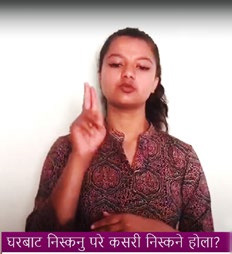Kids with disabilities and COVID-19 awareness
KATHMANDU
Stay home. Wash your hands regularly and thoroughly with soap and water.
Do not hug and shake hands. Stay away from people suffering from fever and cough. Maintain your distance from others. Wear a mask … We are aware about the basics to keep us safe from COVID-19.
“Do not go out and to others’ house in the village — this is what we have been told due to the coronavirus,” shares 20-year-old Ganga Pariyar from Khajura Rural Municipality, Banke. “That is why we are not going out of our house, not even to our neighbours’.”
She knows she has to put on a mask and wash hands with soap and water. All these information on COV- ID-19 was relayed to Pariyar, who is uneducated and with a physical disability, through radio, villagers and volunteers of Voluntary Service Overseas (VSO) Nepal.
Kanhaiya Kumar Sah is a 10-year-old with visual impairment.
When asked about coronavirus, the resident of Jagarnathpur Rural Municipality, Parsa, talks about “the new type of virus that causes COVID-19”. He is scared of the virus as “it is easily transmitted from one person to another”. He knows all the basic information on COV- ID-19 and how to stay safe. Thanks to VSO Nepal.
As an immediate plan in response to the coronavirus crisis and nation-wide lockdown, the ENGAGE project of VSO Nepal — that aims to provide education to 2,500 adolescents of Banke, Parsa and Sarlahi districts including 300 children with disabilities — is disseminating COVID-19 directives to these children. These directives include from staying at home to keeping children safe from violence, how to take care of family members who are infected or suspected of coronavirus infection, the need to wash their aides like crutches or wheelchairs, and information on hotlines.
Four hundred community volunteers, nine national volunteers, six international volunteers as well as community mobilisers are sharing such information over the phone to these children.
Other mediums include awareness video on COV- ID-19, message shared through sign language and subtitles as well as jingles in local language broadcast through local radio stations — different ways of dissemination as per their ability and disability.
Children with disability — visual impairment, hearing impairment, intellectual impairment, and with functional limitations are vulnerable to coronavirus. As per Abhina Adhikari, Project Coordinator, Volunteer and Program Engagement, VSO Nepal, “There are 94 children with severe disability in the three districts — who cannot function without others’ aid putting them at high risk of getting coronavirus from those who are helping them.
Those with visually impaired function by touching things — this puts them at risk of coronavirus.”
So, VSO felt it was important to disseminate the directives on COVID-19 to these children and their parents/guardians.
And let them know “it is necessary for people taking care of children with physical disability to be cautious, and to wash hands frequently to visually-impaired”. However, it is challenging.
“These children don’t have access to Internet,” shares Adhikari, as such resource material like awareness video can’t reach them. “But community volunteers and mobilisers who have Internet access convey the message to the children of their community through phone calls and follow up with them.”
Even if they receive such videos, the children with hearing impairment are just learning the basic sign language and might not understand the entire message shared through the awareness video using sign language.
“So, community volunteers also known as Big Sisters with support from our national volunteers, are following up on them if they have understood the message or not. National volunteers are also doing followup with their parents and make them understand the video’s message,” explains Adhikari.
The lockdown has created another problem. Anju Dhital is a visually-impaired national volunteer based in Sarlahi. She has translated Inormation Education Communication materials of coronavirus in Braille but “I didn’t know, lockdown would be this long”. She has not been able to share them with four visually-impaired children under her care due to lockdown but she has shared the information with their parents over the phone.
Meanwhile, Deepa Thapa based in Banke, who is a sign language trainer and national volunteer teaching sign language to hearing-impaired Pooja, disseminates information through her parents over the phone.
These volunteers are also coordinating with local government on relief packages distribution especially for children with physical disability.
A version of this article appears in e-paper on May 14, 2020 of The Himalayan Times.





